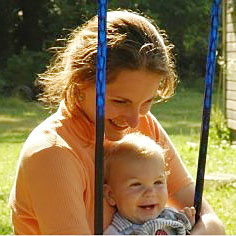by Jennifer Tutwiler
These days, the measure of good parenting seems to be how care-free and enjoyable an existence we have enabled for our children.
Children are expected to play with their toys, play outside, play with their friends, play sports, play with video games… and yet today’s children are some of the most behaviorally challenged in human history.
Why is it that those who are expected to do nothing but enjoy themselves are so troubled behind their smiles?
The answer is that we have robbed them of their dignity as human beings.
Work is a good thing for man–a good thing for his humanity–because through work man not only transforms nature, adapting it to his own needs, but he also achieves fulfillment as a human being and indeed in a sense becomes “more a human being.” John Paul II, On Human Work, 9.
Many people believe that school is a child’s work, but if we have not given them the tools to prepare them for that work, how can we expect them to succeed in it? Through physical work and constructive activities we learn to be attentive, to follow a series of steps, to contribute to the needs of others and to appreciate the outcome of our efforts.
If a child has not experienced this prior to beginning school, they will be ill-equipped to handle the expectations of focus and obedience that school requires.
1. Beginning to Learn
So when should our children begin learning how to work? From the moment they show interest in the work that is happening around them; usually around 18 months.
It is at this point that children often begin following their mother in the kitchen, or picking up laundry that has fallen on its way to the dryer. This is not just curiosity.
Our youngest children are asking to be included in our work. After observing my own six children, and those of other families, I have noticed a common trend: the beginning of “bad” or “mischievous” behavior often coincides with a lack of meaningful activities for a child who is ready for them.
2. Slow & Steady
So how do you start teaching your children to work? Decide what tasks you would like your children to learn and then show them, slowly and methodically, how to do those tasks.
As adults, we tend to assume that our children have absorbed the process for various activities simply because they have seen us do them. Yet, if we adults were asked to do something new, we would expect to be shown, step by step, how to do it correctly.
We must give that same respect to our children.
3. Appropriate Work
What work is appropriate? This is probably the most frequently asked question in chore discussions and there are many good lists available online.
In our family, once a child begins to show interest, we start encouraging him or her to help put laundry in the dryer, hold the dustpan while we sweep, help clear the table, etc.
These are only suggestions until age three when we also teach them how to make the bed and assist with toy pick-up. At this point, they are required to do these things each day.
We also encourage them to be “chore helpers” for their siblings. By age four, they are ready to begin learning chores like sweeping, emptying the dishwasher, emptying wastebaskets, and other related items.
Currently, our three 7-10 year olds are responsible for all dishes and kitchen surfaces, wastebaskets/trash and all pet care. Most of them have also been shown how to vacuum, dust, clean a bathroom, mop and start a load of laundry.
4. A Word About Chore Charts
Children need to understand that, just as an adult’s work contributes to the needs of society, home chores are a way to contribute to the needs of the family; they are not a means to getting the latest toy.
Because of this, we have chosen not to use reward-based chore charts or link allowances to chores.
5. Not Just Chores
As I stated before, physical work is not the only thing that gives our children the tools they need for life. Constructive activities — non-passive activities that require thought and the completion of a series of steps (whether few or many) — are vital to a child’s “fulfillment as a human being”.
Our children need to be given the time and resources to use their minds in thoughtful, creative pursuits. For our family, this meant limiting TV and removing video games completely.
It was very hard to make this transition, but the results have been far beyond what we would have imagined two years ago; when our children are consistently involved in constructive activities, they are completely different children.
Even our potentially-ADD son, who was prone to severe tantrums and arguments—his symptoms have virtually disappeared since being involved in meaningful work on a daily basis.
6. Following the Creator
Understanding the importance, indeed the necessity of meaningful work, Blessed John Paul II reminds us of the importance of rest:
…man ought to imitate God, his creator, in working, because man alone has the unique characteristic of likeness to God. Man ought to imitate God both in working and also in resting, since God himself wished to present his own creative activity under the form of work and rest. — John Paul II, On Human Work, 25.
Our children still need time for free play: running around the backyard, digging in the dirt, or making tracks for their toy trains on the dining room floor. Other times, they may simply need to sit by a window and watch the birds in the backyard.
When combined with meaningful work, this rhythm of work and rest will enable our children to lead a more peaceful life, where they can more clearly hear the voice of their Creator.

 Seton Magazine Catholic Homeschool Articles, Advice & Resources
Seton Magazine Catholic Homeschool Articles, Advice & Resources

